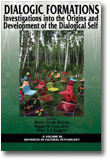
Dialogic Formations
Investigations into the Origins and Development of the Dialogical Self
Edited by:
Marie-Cécile Bertau, Ludwig Maximilians-University
Miguel M. Gonçalves, University of Minho
Peter T. F. Raggatt, James Cook University
A volume in the series: Advances in Cultural Psychology: Constructing Human Development. Editor(s): Jaan Valsiner, Niels Bohr Professor of Cultural Psychology, Aalborg University.
Published 2013
This volume understands itself as an invitation to follow a fundamental shift in perspective, away from the self-contained ‘I’ of Western conventions, and towards a relational self, where development and change are contingent on otherness. In the framework of ‘Dialogical Self Theory’ (Hermans & Hermans-Konopka, 2010; Hermans & Gieser, 2012), it is precisely the forms of interaction and exchange with others and with the world that determine the course of the self’s development.
The volume hence addresses dialogical processes in human interaction from a psychological perspective, bringing together previously separate theoretical traditions about the ‘self’ and about ‘dialogue’ within the innovative framework of Dialogical Self Theory. The book is devoted to developmental questions, and so broaches one of the more difficult and challenging topics for models of a pluralist self: the question of how the dynamics of multiplicity emerge and change over time. This question is explored by addressing ontogenetic questions, directed at the emergence of the dialogical self in early infancy, as well as microgenetic questions, addressed to later developmental dynamics in adulthood. Additionally, development and change in a range of culture-specific settings and practices is also examined, including the practices of mothering, of migration and cross-cultural assimilation, and of ‘doing psychotherapy’.
CONTENTS
Introduction. A Dialogical Paradigm For Psychology, Marie-Cécile Bertau, Miguel M. Gonçalves, and Peter T. F. Raggatt. Series Editor’s Preface. Voices as Vehicles: How the Mind Can Go Beyond Its Local Context, Jaan Valsiner. SECTION I: BASIC PHENOMENOLOGY. The Infant’s Voice Grows In Intimate Dialogue: How Musicality of Expression Inspires Shared Meaning, Colwyn Trevarthen. Exploring Voice: A Psycholinguist’s Inquiry into the Dynamic Materiality of Language, Marie-Cécile Bertau. Commentary. Shared Voices: Commentary on Trevarthen and Bertau, Giannis Kugiumutzakis. SECTION II: CONSTRUCTING SELF AND SYMBOL. Polyphony: A Vivid Source of Self and Symbol, Maya Gratier and Marie-Cécile Bertau. Self and Symbol Emerging from Dialogical Dynamics, Maria C. D. P. Lyra. Commentary. (Dis-)Continuity, (Inter-)Corporeality and Conventionality in Dialogical Development: Commentary on Gratier & Bertau and Lyra, Chris Sinha. Infant’s Early Voice Can Be Found in Their Emotions, Andrea Garvey and Alan Fogel. Negotiating Motherhood: A Dialogical Approach, Filipa Duarte and Miguel M. Gonçalves. Commentary. Mothers, Dialogues, and Support: Commentary on Garvey & Fogel and on Duarte & Gonçalves, Darcia Narvaez. SECTION III: PERFORMING A SELF. Rehearsing Renewal of Identity: Reconceptualization on the Move, Carla Cunha, Miguel M. Gonçalves, Jaan Valsiner, Inês Mendes, and António P. Ribeiro. Personal Chronotopes in the Dialogical Self: A Developmental Case Study, Peter T. F. Raggatt. Commentary. Grappling with the Good: Dialogic Process and the Challenge of Human Values A Commentary on Cunha et al. and on Raggatt, Kenneth J. Gergen. Supervision as a Conversation Among Developing Voices: An Assimilation Model Perspective, Katerine Osatuke and William B. Stiles. Contextual Influences on Acculturation: Psychological Assimilation and Continuing Bonds for Two Immigrants, Hani M. Henry and William B. Stiles, Commentary. When Worlds Collide: Commentary on Osatuke & Stiles and Henry & Stiles, Robert Elliott. About the Authors.
-
Paperback9781623960377
Web price: $45.04 (Reg. 52.99)
-
Hardcover9781623960384
Web price: $80.74 (Reg. 94.99)
- eBook9781623960391

- EDU037000 - EDUCATION: Research
- SOC000000 - SOCIAL SCIENCE: General
- PSY023000 - PSYCHOLOGY: Personality
-
 Culture, Work and Psychology
Invitations to Dialogue
Culture, Work and Psychology
Invitations to Dialogue
-
 Deep Loyalties
Values in Military Lives
Deep Loyalties
Values in Military Lives
-
 Drama of Multilingualism
Literature Review and Liberation
Drama of Multilingualism
Literature Review and Liberation
-
 From Dream to Action
Imagination and (Im)Possible Futures
From Dream to Action
Imagination and (Im)Possible Futures
-
 Home in Transition
The Cultural Construction of Heimat
Home in Transition
The Cultural Construction of Heimat
-
 Making of Distinctions
Towards a Social Science of Inclusive Oppositions
Making of Distinctions
Towards a Social Science of Inclusive Oppositions
-
 Ornamented Lives
Ornamented Lives

